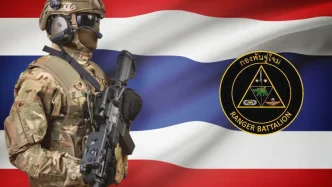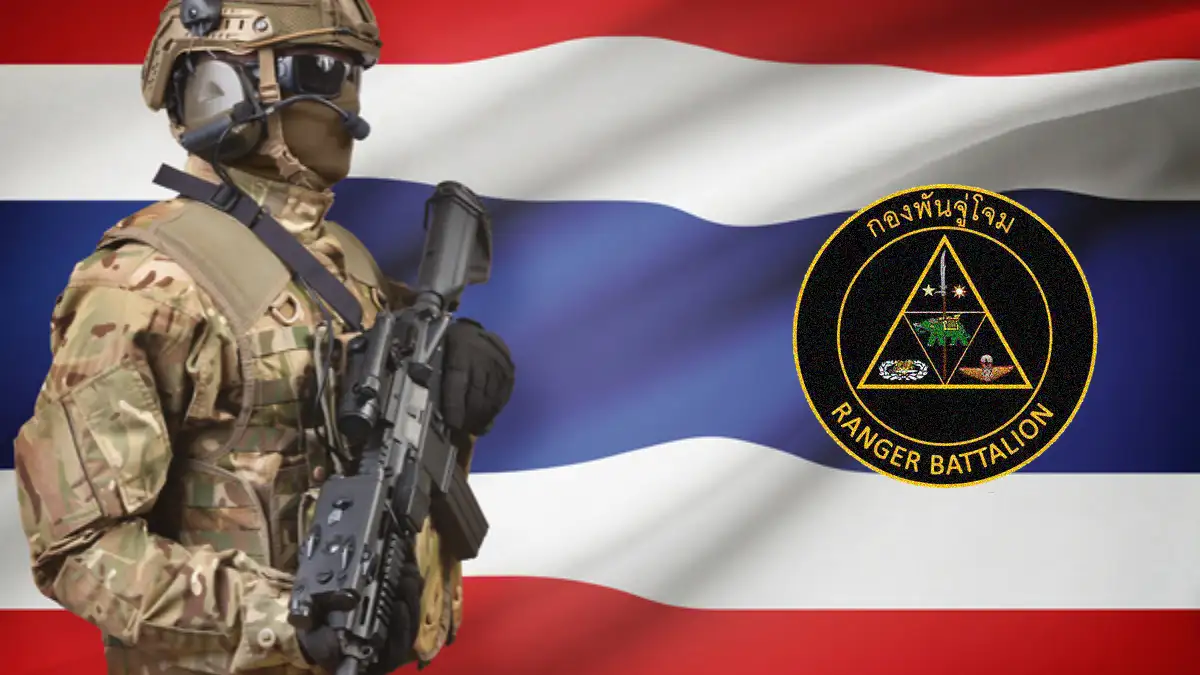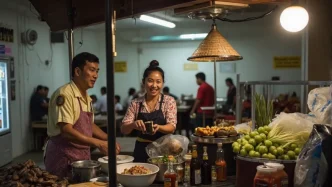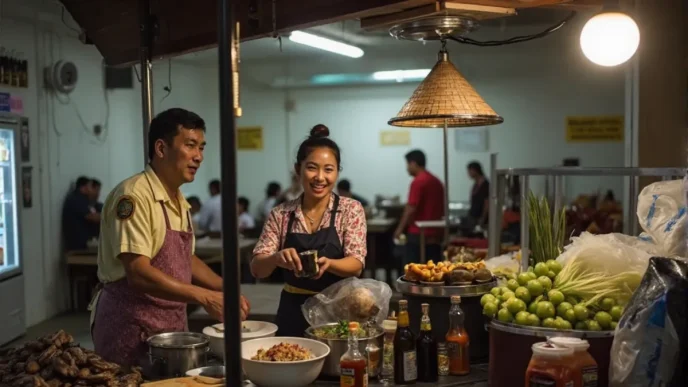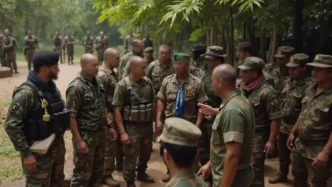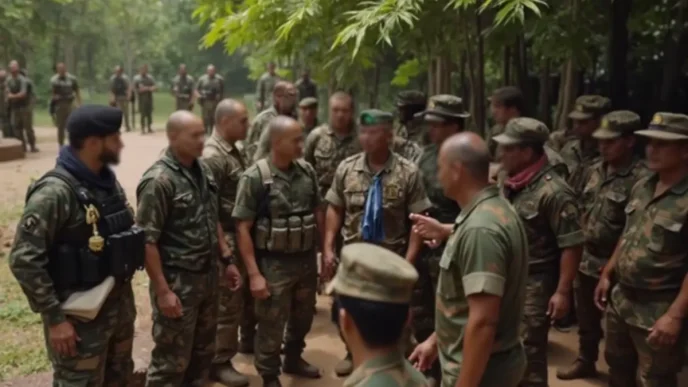A former Thai ranger has been apprehended and is now facing legal action after allegedly assaulting a Cambodian soldier near the historic Ta Muen Thom Temple in Surin province, Thailand, on Sunday. The incident, which occurred at a popular tourist site along the contentious Thai-Cambodian border, has raised concerns about potential strains on local bilateral relations, though authorities on both sides are working to de-escalate tensions.
Details of the Incident
The altercation took place at approximately 10:20 a.m. local time, when a Thai individual, later identified as Sommai (surname withheld), reportedly punched a Cambodian officer from behind and in the face before fleeing the scene. According to Maj Gen Winthai Suvaree, spokesman for the Royal Thai Army (RTA), the incident was detailed in a report from the Suranaree Task Force, which oversees security in the region. Thai authorities swiftly apprehended the suspect following the assault.
Sommai, a former ranger, currently holds the position of president of the volunteer rangers club at Pak Thong Chai camp and leads the veterans network in Samut Sakhon province. His background in military service adds a layer of complexity to the incident, given the sensitive nature of the border area where Thai and Cambodian forces have historically clashed over territorial disputes, including around cultural landmarks like Ta Muen Thom Temple.
The temple, located in Thailand’s Surin province near the border with Cambodia, is a site of historical and cultural significance but also a flashpoint for tensions between the two nations. While it falls under Thai jurisdiction, its proximity to Cambodia has made it a frequent point of contention, with both countries staking claims to surrounding areas in the past. This incident, though seemingly isolated, underscores the fragility of peace in such border zones.
Efforts to Prevent Escalation
In the wake of the assault, Thai military officials have engaged with their Cambodian counterparts to mitigate any potential fallout. Maj Gen Winthai emphasized that, given the location’s status as a tourist hotspot, immediate steps were taken to ensure the incident does not damage local-level bilateral relations. He stated that Thai military officers had spoken with the Cambodian side to help de-escalate tensions, underscoring the need for diplomacy in what was an outlier event. The subtext of Maj Gen Winthai’s words highlighted the importance of maintaining cordial ties and stability in the region.
The suspect has since been handed over to local police for legal proceedings, according to the RTA spokesman. While specific charges have not been disclosed in initial reports, the incident falls under Thailand’s legal jurisdiction, and authorities are expected to pursue appropriate action in line with national laws governing assault and public order.
Historical Context of Thai-Cambodian Border Tensions
The assault near Ta Muen Thom Temple occurs against a backdrop of long-standing border disputes between Thailand and Cambodia, particularly over cultural heritage sites. The most notable conflict centered on the nearby Preah Vihear Temple, a UNESCO World Heritage site, which has been a source of military skirmishes and diplomatic friction for decades. While Ta Muen Thom is smaller and less internationally recognized, it remains emblematic of the broader territorial and cultural disagreements that persist between the two neighbors.
In 2011, clashes over Preah Vihear resulted in casualties on both sides, prompting international intervention and a ruling by the International Court of Justice (ICJ) in 2013 that awarded sovereignty of the temple to Cambodia while leaving surrounding areas disputed. Although direct conflict has subsided in recent years, minor incidents like this assault can quickly reignite local grievances if not handled with care.
Beyond territorial issues, the border region is a vital area for cross-border trade, tourism, and cultural exchange, making stability a priority for both governments. Thailand and Cambodia have worked to improve relations through joint committees and bilateral agreements, but personal altercations involving military or former military personnel, as in this case, risk complicating these efforts. Analysts note that while the incident appears to be an individual act rather than a state-sanctioned one, it could still be leveraged by nationalist factions on either side to stoke public sentiment.
Implications for Local Communities and Tourists
Ta Muen Thom Temple attracts visitors from both Thailand and Cambodia, as well as international tourists interested in the region’s Khmer architectural heritage. The site’s accessibility, however, is often overshadowed by security concerns due to its border location. Sunday’s incident may prompt temporary restrictions on access to the temple, affecting local vendors and guides who rely on tourism for their livelihoods.
For Thai and Cambodian residents near the border, such events are a reminder of the delicate balance that governs their daily interactions. Cross-border markets and familial ties are common in the region, and many locals express hope that this incident will not disrupt the fragile harmony they have cultivated. “We just want to live peacefully and do business” a Thai vendor near the temple told local media, reflecting a sentiment shared by many in the area.
Legal and Diplomatic Ramifications
As Sommai faces legal proceedings, questions arise about the potential diplomatic ramifications of the assault. While the incident does not appear to involve active military personnel on the Thai side, the suspect’s history as a ranger and his current leadership roles in veteran and volunteer networks could draw scrutiny. Cambodian authorities have yet to release an official statement on the matter, but their response will likely influence how the situation unfolds.
Thailand’s legal system will play a critical role in determining the outcome for Sommai. Assault charges in Thailand can carry significant penalties, particularly when involving a foreign national or occurring in a sensitive area. The case may also test the effectiveness of communication channels between Thai and Cambodian authorities, which have been strengthened in recent years to handle cross-border incidents promptly and transparently.
From a broader perspective, this event highlights the challenges of managing border security in areas where historical grievances intersect with modern tourism and economic interests. Both nations have a vested interest in preventing such incidents from escalating into larger conflicts, especially given the economic interdependence of border communities and the shared goal of promoting Southeast Asia as a stable region for investment and travel.
Looking Ahead
As the legal process against Sommai unfolds, the incident near Ta Muen Thom Temple serves as a cautionary tale about the potential for personal actions to impact international relations. While Thai and Cambodian officials appear committed to containing the fallout, the event underscores the need for continued dialogue and cooperation to address underlying tensions in border areas.
For now, the focus remains on ensuring justice is served within Thailand’s legal framework while preserving the goodwill that has been built between the two nations over recent years. How this case is resolved may set a precedent for handling similar incidents in the future, particularly in a region where history, culture, and politics are so deeply intertwined.

